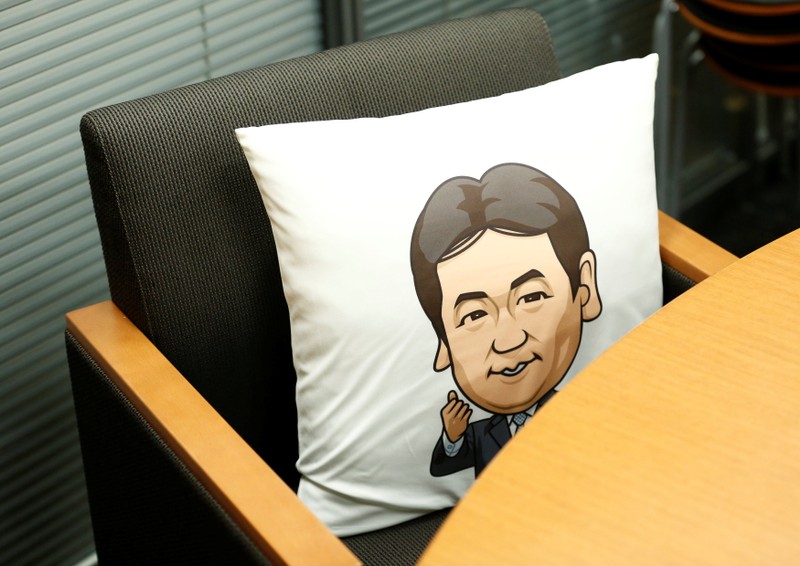
A cushion featuring a caricature of Constitutional Democratic Party of Japan (CDPJ) leader Yukio Edano is seen at his office in Tokyo, Japan December 12, 2017. REUTERS/Kim Kyung-Hoon
December 12, 2017
By Linda Sieg and Ami Miyazaki
TOKYO (Reuters) – The leader of the small Constitutional Democratic Party of Japan, which out-performed expectations in an October vote, now hopes that by offering clear policy alternatives he can oust Prime Minister Shinto Abe’s coalition in the next election.
One key to achieving that ambitious goal, said party founder Yukio Edano, is an economic platform that puts more weight on redistributing wealth, including by raising corporate taxes to push firms to use their cash reserves to raise wages.
“Unless we have reasonable redistribution to achieve growth, domestic demand will not expand,” Edano, 53, told Reuters in an interview.
“That is a clear difference from the LDP,” he said, referring to the ruling Liberal Democratic Party.
The CDPJ was formed less than three weeks before the Oct. 22 election, after the then-main opposition Democratic Party’s leader decided not to field candidates and encouraged them to run on Tokyo Governor Yuriko Koike’s novice conservative party’s slate.
It grabbed the top opposition spot in the lower house poll, although its 54 seats are dwarfed by the 283 won by Abe’s conservative LDP.
“Since we are the biggest opposition party, we must aim at a change in government in the next election, or else democracy is not functioning,” said Edano, who said he was surprised by his party’s success.
“That is our responsibility.”
The next general election must be held by October 2021.
‘CLEAR POSITIONS’
The CDPJ opposes Abe’s proposal to revise Article 9 of Japan’s post-war constitution, which bans a standing military but has been interpreted to allow armed forces exclusively for self defense, and unlike the more authoritarian LDP, stresses civil rights rather than obligations to the state.
The party appears to have a long way to go, given support at 7.9 percent against 38.1 percent for the LDP in a survey by NHK public broadcaster this week.
Edano’s fighting words, however, mark a contrast from the failed Democratic Party’s stance in recent polls, when it aimed only to keep Abe’s coalition from winning a two-thirds “super majority” rather than ousting it.
Edano said he would not repeat the mistakes of the Democrats, which from the start was an amalgam of conservatives, liberals and ex-socialists and ended up being plagued by infighting during its 2009-2012 term in office.
“Our positions were clear,” he said, explaining why he thought the CDPJ outperformed opposition rivals. “We must not make our ideas and policies vague just to broaden (the party).”
Edano said Abe’s biggest defect was his apparent belief that a majority entitled him to do whatever he wanted. Abe, whose support was at 49 percent in the NHK poll, saw his ratings sink this year partly due to perceptions he had grown arrogant.
“Democracy doesn’t mean you get a blank cheque,” Edano said.
(Reporting by Linda Sieg; Editing by Robert Birsel)

